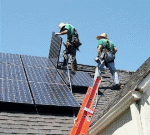
It seems everyone is jumping on the 'green' bandwagon. Recycling is now a part of our daily lives, and we are doing more and more to get our energy from natural sources like the wind and sun. In fact, many homeowners are now installing solar panels on their property in order to not only lessen their carbon footprint, but also take advantage of the money-back incentives which are in place.
But some confusion remains about how the installation of solar panels affects homeowner's insurance coverage. Can you expect to pay more for insurance by installing solar panels, and is it even worth it to you to do so?
How Solar Panels Affect Homeowners Insurance
You may be pleasantly surprised to discover that most insurance companies will cover the cost of solar panel installation on your home or property. In fact, you may discover that you are actually quoted a discounted amount for coverage if you already have solar panels installed on your home. This is because those concerned about the environment are less likely to engage in activity that contradicts this view, such as smoking. Because smoking increases the risk of a fire starting in the home, these individuals likely pay more for insurance.
Unfortunately, there are some companies that will charge additional fees for solar panels that either already exists, or plan to be installed on a property. It really comes down to how the company views solar panels: as either a benefit to your home's value, or a disadvantage.
Should You Consider Additional Coverage For Solar Panels?
Experts recommend purchasing additional coverage for new solar panel installations. This is because an installation can become the victim of many damaging variables, such as that from falling foreign objects, lightning damage and so forth.
Of course, this kind of damage can affect solar panel systems of any age, but the longer a system has been on a property, the more that is known about the potential threats which may surround it.
There are several advantages to purchasing additional solar panel system coverage. For systems installed on the ground, coverage protects vandalism and theft. And all systems can be protected from things like fire and inclement weather. Any damage that is covered can actually save a homeowner a lot of money in replacement costs.
Your Local Climate
The weather in your area will be a major considering when you apply for coverage for your solar panel system. For example, if you live in an area where storms are a regular and frequent occurrence, this represents more of a risk to your solar panel system, and will result in higher premiums.
However, you may not have to worry about the cost of premiums if you have panels installed by a local company. This is because you may be able to obtain special panels for your area that can resist the weather.
Return on Investment
The installation of solar panels should be thought of as a long-term investment. But how long do homeowners need to wait in order to pay off their solar panel systems? This actually depends on several things, including the size of the roof, number of installed panels, how efficient the system is and how many hours of sunlight the panels get per day.
The Future of Solar Panel Insurance Coverage
Will additional coverage always be required for solar panels? Perhaps not if they continue enjoying their current popularity. Apparently, solar panels are almost standard on new homes in several markets, with 6 of 10 homebuilding companies now including solar panel installation in the new construction of homes.
And contrary to how it may appear, it is actually cheaper to install solar panels during home construction, saving homeowners about 20% when compared with post-construction installation. The fact that solar panels may be becoming a home construction standard vs. an after-market add-on is good news, both for homeowners and for the environment.
Citations:
Guest author Carly Jorge writes on a variety of topics related to home ownership, including how to compare homeowners insurance quotes in order to get coverage that meets your needs.
